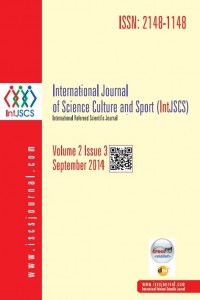The relationship between perfectionism of managers and Empowerment staff of physical education offices in Tehran
Öz
The aim of the present study is relationship between perfectionism of managers and empowerment staff of physical education offices in Tehran. This research is a descriptive – correlation, from Perspective of Nature, Applicable. The population of this research consisted of managers and administrative staff in physical education offices of Tehran are the number of 351 persons. The sample estimate of the population and with using Morgan’s table And Karjsi and 185 patients were selected using stratified random number, of which 50 were managers and 135 employees. Independent variables were instrumented perfectionism of managers, 59 item questionnaires of Hill and Associates (2004) and tools to measure the dependent variable of empowerment personnel was 16-item questionnaire Aspretizr (2002). Statistical methods was included descriptive statistics and inferential statistics (Pearson and Friedman) and the results in general showed a there is significant relationship between perfectionism of managers and capabilities of personnel. And so dimensions of perfectionism of Managers had a meaningful significant negative relationship with empowerment personnel. However, discipline and stress had the strongest associations with empowerment personnel.
Anahtar Kelimeler
Kaynakça
- Anshel, M. H., Weatherby, N. L., Kang, M., & Watson, T. (2009). Rasch calibration of a unidimensional perfectionism inventory for sport. Psychology of Sport and Exercise, 10, 210–216.
- Argyris, C. (1998). Empowerment the Emperors NewClothes, Harvard Business Review.
- Ashby, J. S., & Rice, K. J. (2010). Perfectionism, dysfunctional attitudes and self- esteem. Journal of Counseling & Development, 197- 203.
- Bardone-Cone, A. M., Abramson, L. Y., Heatherton, T. F., & Joiner, T. E. (2006). Perfectionism. Self efficacy in staff, Departman of Psychological Sciences, university of Missouri-Colombia.
- Blanchard, K. H., Arlos, J. P., & Randolph, A. (2003). Empowerment Take More Than One Minute, Barrett-Koehler. Sanfrancisco
- Egan, S. (2005). An Investigation of positive and negative perfectionism .Thesis submitted in partial fulfillment of the requirements for the degree of master of Arts in psychology, faculty of psychology .Curtin University of technology human research.
- Hewitt, P. L., & Flett, G. L. (2002). Dimensions of Perfectionism, Empowerment and social skills, Personality and Individual Deferences, 143-150.
- Hill, R. W., Huelsman, T. J., Furr, R. M., Kibler, J., Vicente, B. B., & Kennedy, C. (2004). A New Measure of Perfectionism: The Perfectionism Inventory. Journal of Personality Assessment, 82(1), 80-89.
- Koberg, C. S., Boss, R., Wayme, S., Janson, C., & Goodman, E. A. (1999). Antecedents & Out Comes of Empowerment; Group & Organization Management, Issue 1.
- Rice, K. G., Bair, C., Castro, J. R., Cohen, B. N., & Hood, C. A. (2003). Meaning of Perfectionism :A quantities and qualitative analysis, Journal of cognitive phycology therapy :An international quarterly, 17, 39-57.
- Soenens, B., Elliot, A. J., Vansteenkiste, M., Luyten, P., & Duriez, B. (2004). The Relationship Perfectionism Management and Job Satisfaction Staff. Organization Management, 4(1), 54-69.
- Spreitzer, G. M. (2002). Psychology empowerment in the workplace. Dimensions. Measurement. and Validation. The Academy of Management Journal, 38(5), 1442-1465.
- Stoeber, J., & Otto, K. (2006). Positive conceptions of Perfectionism :approaches. Evidence ,challenges, Personality and social psychological review, 10, 295-319.
- Sumik, T., Suzuki, A., & Kandak, N. (2009). Perfectionism and Job performance among Japanese Staff. Journal of Organization Management, 5(2), 145-178.
- Young, E. A., Clopton, J. R., & Bleckley, M. K. (2004). Parental perfectionism and Staff's self-esteem. Department of Management, Texas Tech University.
Öz
Kaynakça
- Anshel, M. H., Weatherby, N. L., Kang, M., & Watson, T. (2009). Rasch calibration of a unidimensional perfectionism inventory for sport. Psychology of Sport and Exercise, 10, 210–216.
- Argyris, C. (1998). Empowerment the Emperors NewClothes, Harvard Business Review.
- Ashby, J. S., & Rice, K. J. (2010). Perfectionism, dysfunctional attitudes and self- esteem. Journal of Counseling & Development, 197- 203.
- Bardone-Cone, A. M., Abramson, L. Y., Heatherton, T. F., & Joiner, T. E. (2006). Perfectionism. Self efficacy in staff, Departman of Psychological Sciences, university of Missouri-Colombia.
- Blanchard, K. H., Arlos, J. P., & Randolph, A. (2003). Empowerment Take More Than One Minute, Barrett-Koehler. Sanfrancisco
- Egan, S. (2005). An Investigation of positive and negative perfectionism .Thesis submitted in partial fulfillment of the requirements for the degree of master of Arts in psychology, faculty of psychology .Curtin University of technology human research.
- Hewitt, P. L., & Flett, G. L. (2002). Dimensions of Perfectionism, Empowerment and social skills, Personality and Individual Deferences, 143-150.
- Hill, R. W., Huelsman, T. J., Furr, R. M., Kibler, J., Vicente, B. B., & Kennedy, C. (2004). A New Measure of Perfectionism: The Perfectionism Inventory. Journal of Personality Assessment, 82(1), 80-89.
- Koberg, C. S., Boss, R., Wayme, S., Janson, C., & Goodman, E. A. (1999). Antecedents & Out Comes of Empowerment; Group & Organization Management, Issue 1.
- Rice, K. G., Bair, C., Castro, J. R., Cohen, B. N., & Hood, C. A. (2003). Meaning of Perfectionism :A quantities and qualitative analysis, Journal of cognitive phycology therapy :An international quarterly, 17, 39-57.
- Soenens, B., Elliot, A. J., Vansteenkiste, M., Luyten, P., & Duriez, B. (2004). The Relationship Perfectionism Management and Job Satisfaction Staff. Organization Management, 4(1), 54-69.
- Spreitzer, G. M. (2002). Psychology empowerment in the workplace. Dimensions. Measurement. and Validation. The Academy of Management Journal, 38(5), 1442-1465.
- Stoeber, J., & Otto, K. (2006). Positive conceptions of Perfectionism :approaches. Evidence ,challenges, Personality and social psychological review, 10, 295-319.
- Sumik, T., Suzuki, A., & Kandak, N. (2009). Perfectionism and Job performance among Japanese Staff. Journal of Organization Management, 5(2), 145-178.
- Young, E. A., Clopton, J. R., & Bleckley, M. K. (2004). Parental perfectionism and Staff's self-esteem. Department of Management, Texas Tech University.
Ayrıntılar
| Birincil Dil | İngilizce |
|---|---|
| Bölüm | Makaleler |
| Yazarlar | |
| Yayımlanma Tarihi | 17 Nisan 2015 |
| Yayımlandığı Sayı | Yıl 2014 Cilt 2 - Sayı 3 |


